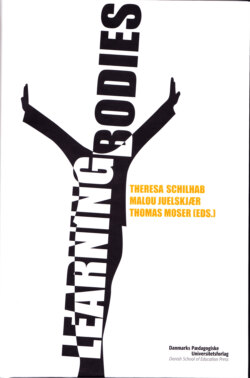Читать книгу Learning Bodies - Группа авторов - Страница 7
На сайте Литреса книга снята с продажи.
The knowing body (part one)
ОглавлениеThe first section opens with a chapter by Theresa Schilhab & Christian Gerlach Embodiment, corporeality and neuroscience. They address embodiment from the biological perspective and through the field of cognitive neuroscience. They use empirical research about the effects of brain damage on peoples’ ability to talk, make classifications and remember to explore how the body is an active component that adds uniquely and indispensably to cognition. Through this analysis Schilhab and Gerlach seek out (traces of) links between cognitive processes and the body, thereby offering new understanding of the constitutive relationship between body and cognition and ‘evidence’ of embodied cognition.
Reinhard Stelter addresses Learning in the light of the first-person approach. This is the first of three chapters by Stelter, dedicated to various perspectives of learning and body from a phenomenomenal point of view. Here, Stelter describes and presents the first-person perspective as a source of the individual’s deeper understanding of his/her interplay with a specific context and environment. This perspective is connected to the concept of the lived body. Embodied knowledge expressed from the first-person perspective can be viewed as the basis for personal and social meaning-making and as an important dimension for the building of communities of practice. Only through the understanding of each others’ experiences, thoughts, reflections, values, motives and aims, Stelter argues, can we establish well-functioning learning- and working communities.
In Body, emotions and learning Simon Nørby’s leitmotif is to investigate whether emotional learning and emotional influences on cognitive learning are critically dependent on the body. Nørby questions and criticises, thoroughly and carefully through-out the chapter. Thereby providing a thorough insight in the neuropsychological approach to the relation between bodies, emotions and learning, showing how central theories and empirical evidence relating emotions, body and learning can be seriously questioned.
